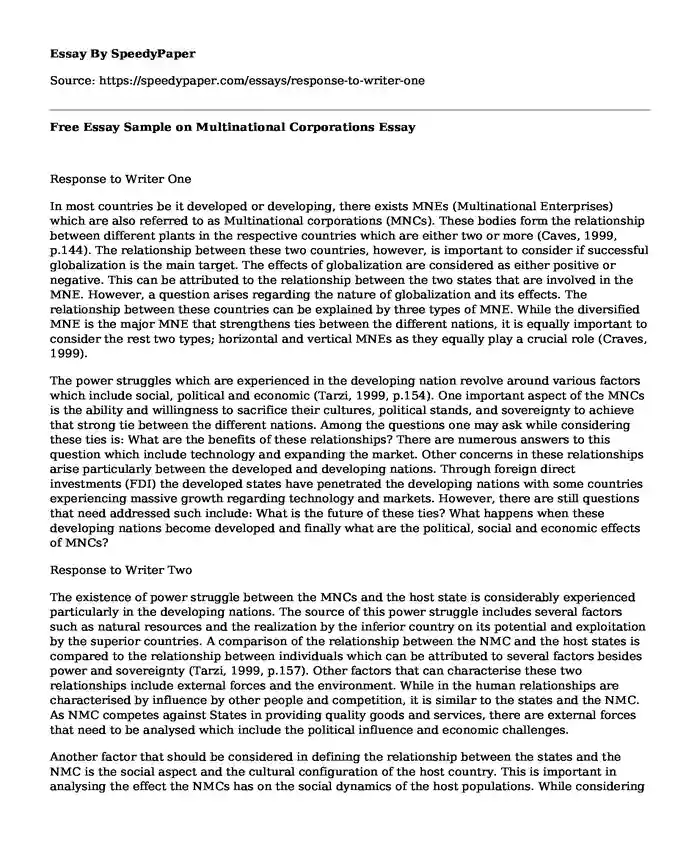
| Type of paper: | Essay |
| Categories: | Management Business International relations |
| Pages: | 3 |
| Wordcount: | 678 words |
Response to Writer One
In most countries be it developed or developing, there exists MNEs (Multinational Enterprises) which are also referred to as Multinational corporations (MNCs). These bodies form the relationship between different plants in the respective countries which are either two or more (Caves, 1999, p.144). The relationship between these two countries, however, is important to consider if successful globalization is the main target. The effects of globalization are considered as either positive or negative. This can be attributed to the relationship between the two states that are involved in the MNE. However, a question arises regarding the nature of globalization and its effects. The relationship between these countries can be explained by three types of MNE. While the diversified MNE is the major MNE that strengthens ties between the different nations, it is equally important to consider the rest two types; horizontal and vertical MNEs as they equally play a crucial role (Craves, 1999).
The power struggles which are experienced in the developing nation revolve around various factors which include social, political and economic (Tarzi, 1999, p.154). One important aspect of the MNCs is the ability and willingness to sacrifice their cultures, political stands, and sovereignty to achieve that strong tie between the different nations. Among the questions one may ask while considering these ties is: What are the benefits of these relationships? There are numerous answers to this question which include technology and expanding the market. Other concerns in these relationships arise particularly between the developed and developing nations. Through foreign direct investments (FDI) the developed states have penetrated the developing nations with some countries experiencing massive growth regarding technology and markets. However, there are still questions that need addressed such include: What is the future of these ties? What happens when these developing nations become developed and finally what are the political, social and economic effects of MNCs?
Response to Writer Two
The existence of power struggle between the MNCs and the host state is considerably experienced particularly in the developing nations. The source of this power struggle includes several factors such as natural resources and the realization by the inferior country on its potential and exploitation by the superior countries. A comparison of the relationship between the NMC and the host states is compared to the relationship between individuals which can be attributed to several factors besides power and sovereignty (Tarzi, 1999, p.157). Other factors that can characterise these two relationships include external forces and the environment. While in the human relationships are characterised by influence by other people and competition, it is similar to the states and the NMC. As NMC competes against States in providing quality goods and services, there are external forces that need to be analysed which include the political influence and economic challenges.
Another factor that should be considered in defining the relationship between the states and the NMC is the social aspect and the cultural configuration of the host country. This is important in analysing the effect the NMCs has on the social dynamics of the host populations. While considering the Middle East case, indeed it can be shown that the relationship between the developing nation and the developed nation has a challenge which revolves around the natural resources and the realization of the country potential (Aldaeaj et al., 1991). The conclusive argument, however, should be based on answering the following question, what are the options available in solving such conflicts in future? Also, a found discussion should address the following concerns on what the developing nations should do to ensure maximum exploitation of its resources without conflicts with the MNCs. Additionally, facts should be provided on what next for the NMCs after all the developing countries become developed.
References
Aldaeaj, Hamad, Mary S. Thibodeaux, and Ercan G. Nasif. 1991. A power model of multinational corporation - nation-state relationships. S.A.M. Advanced Management Journal56 (3): 11.
Caves, Richard E. 1999. "Chapter 9: The Multinational Enterprise as an Economic Organization." In International Political Economy, 145-155.
Tarzi, Shah M. 1999. "Chapter 10: Third World Governments and Multinational Corporations: Dynamics of Host's Bargaining Power." In International Political Economy, 156-166.
Cite this page
Free Essay Sample on Multinational Corporations. (2019, Sep 30). Retrieved from https://speedypaper.net/essays/response-to-writer-one
Request Removal
If you are the original author of this essay and no longer wish to have it published on the SpeedyPaper website, please click below to request its removal:
- Biology Essay Example: Photosynthesis Pathway
- Free Essay with Business Growth Strategies
- Solving Contemporary Ethical Issue. Free Essay.
- Essay Sample on Breast Lumps: Questions and Answers
- Essay Example on Norman Knight Center for Clinical and Professional Development
- Vogue Fashion-Shows
- Essay Sample on Failed Collaboration and Organizational Behavior
Popular categories




